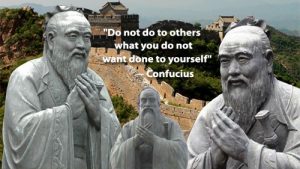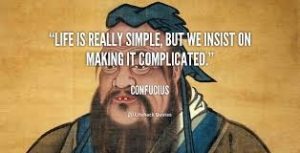What is Confucianism?
 Kong Qiu famously known as Confucius was a Chinese teacher, editor, politician, and philosopher of the approximately until 403 BC which is also called the Spring and Autumn Period of Chinese history which corresponds roughly to the first half of the Eastern Zhou dynasty. This period can also be described further as a golden era because the concept of morality was established and practiced. Confucius emphasized personal and governmental morality, correctness of social relationships, justice and sincerity. His followers competed successfully with many other schools during the Hundred Schools of Thoughts. The concept ‘hundred schools of thought’ refer to an era of great cultural and intellectual expansion in China. Though, that era was loaded with chaos and bloody battles, but it was also known as the Golden Age of Chinese philosophy because a broad range of thoughts and ideas were developed and discussed freely. This phenomenon is also been called the Contention of a Hundred Schools of Thought. The Qin Dynasty tried to suppress Confucius’s philosophy and thinking but Qin lost his dynasty soon, and Confucius’s thoughts received official sanction and were further developed into a system known as ‘Confucianism’.
Kong Qiu famously known as Confucius was a Chinese teacher, editor, politician, and philosopher of the approximately until 403 BC which is also called the Spring and Autumn Period of Chinese history which corresponds roughly to the first half of the Eastern Zhou dynasty. This period can also be described further as a golden era because the concept of morality was established and practiced. Confucius emphasized personal and governmental morality, correctness of social relationships, justice and sincerity. His followers competed successfully with many other schools during the Hundred Schools of Thoughts. The concept ‘hundred schools of thought’ refer to an era of great cultural and intellectual expansion in China. Though, that era was loaded with chaos and bloody battles, but it was also known as the Golden Age of Chinese philosophy because a broad range of thoughts and ideas were developed and discussed freely. This phenomenon is also been called the Contention of a Hundred Schools of Thought. The Qin Dynasty tried to suppress Confucius’s philosophy and thinking but Qin lost his dynasty soon, and Confucius’s thoughts received official sanction and were further developed into a system known as ‘Confucianism’.
Confucius’s teachings center on graceful existence of people; he also imbibed correctness and integrity in his philosophy. It seems Confucius was threatened with his life; but he kept going. He used say “I hear and forget. I see and I remember. I do and I understand.” He believed that every human being is capable of cultivating moral feelings and virtues. To the morally cultivated individual, virtue is what he or she desires for its own sake and virtuousness is the foundation of a successful society.
If you read Confucianism in details, you will observe that Confucius overestimated the power of virtue. Virtue cannot protect the weak against the strong, and it is powerless against wickedness and naked selfishness. In pressing situations, people often simply find it more convenient to resort or submit to the use of power in order to protect themselves or advance their interests. Ironically, Confucius was keenly aware that his moral approach could not save the world from moral and political decay.
 Confucianism is a complex system of social and political ethics based on dutiful piety, kinship, loyalty and righteousness. His teachings cover a wide range from how a “true gentleman” should behave in his daily life to how a ruler should govern with a benevolent concern for the well-being of his subjects. In other words, it’s a kind of moral guide and direction for good governance based on values of hierarchy, group orientation, and respect for seniors in age and tradition. The Confucian system is based on morality.
Confucianism is a complex system of social and political ethics based on dutiful piety, kinship, loyalty and righteousness. His teachings cover a wide range from how a “true gentleman” should behave in his daily life to how a ruler should govern with a benevolent concern for the well-being of his subjects. In other words, it’s a kind of moral guide and direction for good governance based on values of hierarchy, group orientation, and respect for seniors in age and tradition. The Confucian system is based on morality.
The Analects of Confucius is a collection of sayings and ideas discussed between him and his followers and contemporaries, traditionally believed to have been written by Confucius’ followers. The Analects was considered merely a commentary. But its status grew to be one of the central texts of Confucianism. The Analects has been one of the most widely read and studied books in China for the last 2,000 years, and continues to have a substantial influence on Chinese and East Asian’s thoughts and values today. In today’s chaotic world where morality has lost its value it’s all the more important for us to read about Confucianism. Once Confucianism is saved, it could make the world a much better place to live in.
Today’s generation feels that Confucianism is a very old tradition of thought that can no longer work effectively. They feel it is utopian in nature; hence for the modern world it requires systematic reconstruction. Confucianism also needs saving because of the chronic gap between its political ideals and the reality of societal circumstances. But to save Confucianism and to let it save the world, we must first learn its profound insights and its profound failures. Even in those days i.e 403 BC the political elite were motivated more by self-interest than by virtue, and played by the rules of power rather than the rules of rituals designed to ensure good governance. Same is the case even today. Confucius’s solution was to revitalize the style of governance. He observed that power goes to head and it is difficult to stay grounded when people have power in their hands.
 Confucius felt that legalism spoils the social fabric; legalism is based on the belief that people are evil by nature and that people behave properly only if compelled by strict laws and harsh punishments. Xunzi who was one of the contemporaries of Confucius, led to the development of Legalism. He believed that people had to be forced to make the right decision. He did not believe in the essential goodness of all human beings, and he did not believe that they could make the right decisions. Whereas, Confucius felt that reward and punishment makes people shameless and turns them further away from independent moral cultivation. To accept Legalism is equal to abandoning the best aspects of humanity. Second, reward and punishment alone cannot ensure long-term stability and peace. If people have no virtue, sophisticated systems of sanction only breed ingenious crimes, and no government of any kind can save the day. If you see our system closely, that’s what criminals do. They study the loopholes in laws and exploit it to the hilt.
Confucius felt that legalism spoils the social fabric; legalism is based on the belief that people are evil by nature and that people behave properly only if compelled by strict laws and harsh punishments. Xunzi who was one of the contemporaries of Confucius, led to the development of Legalism. He believed that people had to be forced to make the right decision. He did not believe in the essential goodness of all human beings, and he did not believe that they could make the right decisions. Whereas, Confucius felt that reward and punishment makes people shameless and turns them further away from independent moral cultivation. To accept Legalism is equal to abandoning the best aspects of humanity. Second, reward and punishment alone cannot ensure long-term stability and peace. If people have no virtue, sophisticated systems of sanction only breed ingenious crimes, and no government of any kind can save the day. If you see our system closely, that’s what criminals do. They study the loopholes in laws and exploit it to the hilt.
The Confucians cannot agree with the Legalist strategy, yet they admit that their rituals and virtues fail to control elite behavior. The challenge then becomes this: Is there any alternative that effectively tackles problems in the non-ideal world and yet retains Confucian ideal aspirations? This question has haunted Confucians for over 2,500 years, and continues to do so even today.
The best way to meet this challenge is to adopt liberal democratic institutions that are shaped by the Confucian conception. Confucianism has good instrumental reasons to adopt democracy, because of its view that political authority exists for the happiness of the people. Under suitable social and economic conditions, the institutions of liberal democracy – limited government, democratic elections, human rights, and civil liberties appear to be more effective than other political systems in restraining political power, preventing unconcealed corruption, and forcing elected officials to work for and respond to the people. Well, all this does sound utopian.
 While democracy can promote and express Confucian values, Confucianism can also work to the advantage of democracy. For a democracy to function well and not deteriorate into aggressive politics based on narrow self-interest, it needs virtuous citizens. The cultivation of Confucian morals, as a form of humanity-based moral education, may well be more effective than liberal civic education in instilling the virtues of such a citizenry.
While democracy can promote and express Confucian values, Confucianism can also work to the advantage of democracy. For a democracy to function well and not deteriorate into aggressive politics based on narrow self-interest, it needs virtuous citizens. The cultivation of Confucian morals, as a form of humanity-based moral education, may well be more effective than liberal civic education in instilling the virtues of such a citizenry.
Confucianism can also provide food for thought on how to select virtuous and competent people to serve in politics. If democratic elections do not furnish an adequate number of high-caliber politicians, or if they discourage politicians from making policies conducive to the people’s long-term interests, Confucianism would consider alternative institutions to supplement democracy. By way of example, establishing a second legislative chamber whose members consist of seasoned participants in public service with good reputation in serving the people.
The Confucius Institute program began in 2004 and is overseen by Hanban – the Office of Chinese Language Council International. The program is governed by a council whose top-level members are drawn from Communist Party of China and various state ministries. The institutes operate in co-operation with local affiliate colleges and universities around the world, and financing is shared between Hanban and the host institutions. The related Confucius Classroom program partners with local secondary schools or school districts to provide teachers and instructional materials. Confucius Institutes are sometimes compared to language and culture promotion organizations such as Britain’s British Council, France’s Alliance Françoise and Germany’s Goethe Institute. Unlike these organizations, however, Confucius Institutes operate within established universities, colleges, and secondary schools around the world, providing funding, teachers and educational materials.













































